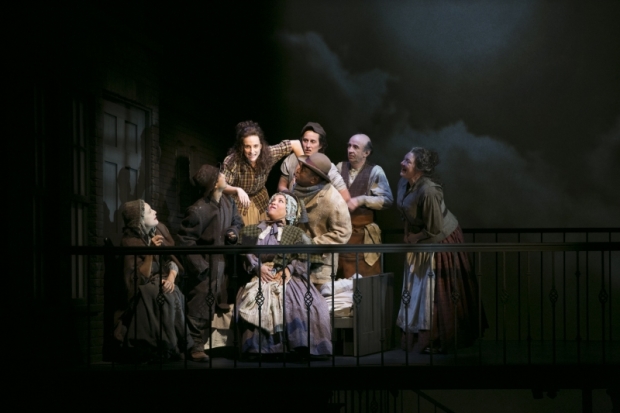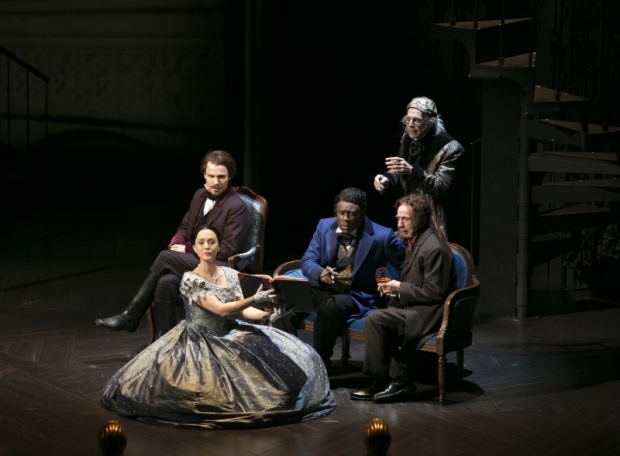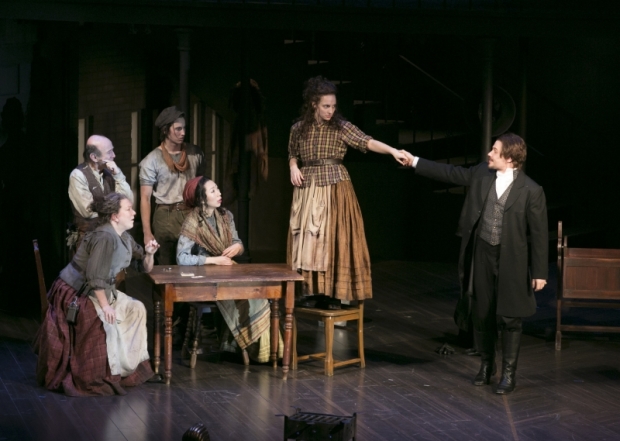Fingersmith

(© Evgenia Eliseeva)
In its latest transition, Sarah Waters' much praised Fingersmith has morphed from historical novel to BBC-TV series to film (The Handmaiden, by Park Chan-wook) and to the stage, in an adaptation at American Repertory Theater by multiple Emmy Award nominee and playwright Alexa Junge. To say that wrestling the nearly 600-page historical novel, set in 19th century England to two and a half hours is a challenge is to ignore the vast differences between literature and drama.
To be sure, a good story filled with ingenuity, twists, and surprises is welcome, but this one also comes with a 21st-century through-line about class and gender. Stuffing the voluminous amount of back story into a plausible and coherent manner for an audience makes the task even more difficult.
The complex narrative revolves around Sue Trinder (Tracee Chimo) and Maud Lilly (Christina Bennett Lind), two orphan girls raised in vastly different settings. Sue was taken in by Mrs. Sucksby (Kristine Nielsen), a "baby farmer" who cares for abandoned children and no doubt sells them. While Mrs. Sucksby is a mother figure to these children, she is also the heart and brains of a crew of thieves and pickpockets fencing their stolen goods in a Dickensian pocket of London. As a result, Sue works the streets with the best of them, but polite language, good manners, reading and writing are not among her skills. In contrast, after age ten, Maud has lived in a gloomy, remote mansion with her uncle who trained her from childhood to serve as his secretary. She learned to do as she was told or suffer severe punishments. Kindness and love were never part of her education.
When Richard "Gentleman" Rivers (Josiah Bania), a younger son from a good family but a "scoundrel con man," learns that Maud is an heiress, he determines to wheedle his way into her uncle's good graces, marry Maud, and steal her money. Sue is enlisted to leave London to serve as Maud's lady's maid and help seduce her. From that point it's game on, with numerous plot lines, ever-changing relationships, and turns of the wheel of fortune.

(© Evgenia Eliseeva)
The supporting cast and ensemble, including two children (Morgan Jamie Benard and Giana Ribeiro as the young Sue and Maud), take on double and triple roles, to portray nearly 30 characters.
Sue and Maud speak directly to the audience as narrators of a story each claims as her own, but at times it seems that Nielsen's riveting performance as Mrs. Sucksby makes her the protagonist. She is forthright in her mastery of the gang on the streets, heroic as she changes her loyalties, and poignant in accepting her fate. Along with delivering a large amount of exposition, Chimo is saddled with a cockney accent, while Maud speaks in the plum-shaped tones of the British upper class. Otherwise, Chimo and Lind are fine in their characterizations, and especially well tuned to each other.
Junge has taken the risk of moving the chronology backwards before pushing the story through to its climax. Although the romance is predictable by the middle of Act I, neither the emphasis on the love story as the major theme nor a contemporary attitude towards partners is clear until the end of the work.
Director Bill Rauch has an excellent eye for explicit stage pictures, which is aided by set designer Christopher Acebo and lighting designer Jen Shriever. Together they work to blend the disparate locations into a scenic design that helps to clarify time and place.
Unlike Oliver, which focuses the audience's involvement on both the abused child and Nancy's tragic history, or the theatrical adaptation of Nicholas Nickleby, which needed six hours to fill in the details, Fingersmith suffers from too "much of a muchness," as Lewis Carroll might have observed. Similar to storytelling, the art of a pick isn't in how well you can distract your target, but rather in how simply and steadily you can execute the sleight of hand.

(© Evgenia Eliseeva)











